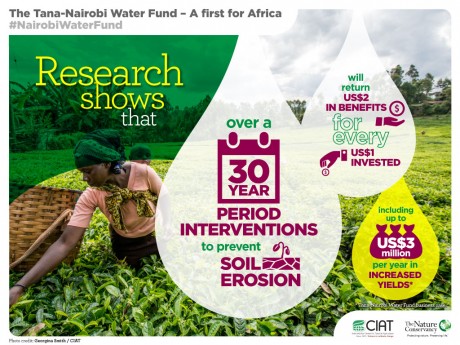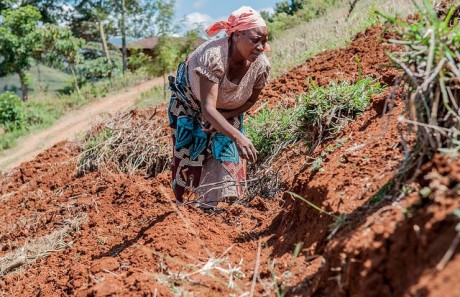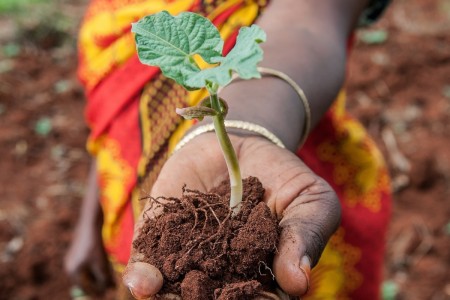April 19 to 23 marks Global Soil Week 2015. Soils are an often-overlooked but invaluable resource for ecosystems and the agricultural systems they sustain. However, land degradation – including soil erosion and nutrient depletion – reduces the ecological integrity of landscapes, negatively impacting productivity. The CGIAR Research Program on Water, Land and Ecosystems (WLE) recognizes the importance of soil health, and is working to identify and implement sustainable land management approaches for restoring degraded ecosystems.
The United Nations has designated 2015 as the International Year of Soils and this week’s conference in Berlin, Germany will highlight the transformative role that soil can play in helping to achieving the Sustainable Development Goals. WLE partner, the International Center for Tropical Agriculture (CIAT), will lead a number of events.
Tana-Nairobi Water Fund

The Tana-Nairobi Water Fund is a public-private scheme uniting big business, utilities, conservation groups, government, researchers and farmers. It aims to increase farm productivity upstream, while improving water supply and cutting costs of hydropower and clean water for users downstream, and is designed to generate US$21.5 million in long-term benefits to Kenyan citizens, including farmers and businesses. The initiative, the first of its kind in Africa, was launched by The Nature Conservancy and partners, including CIAT, in March 2015. [read more]
When it comes to spreading farming insights amongst smallholder farmers in Africa, TV can have a big impact. Together with the CGIAR Research Program on Climate Change, Agriculture and Food Security (CCAFS), WLE sponsored five episodes of ‘Shamba Shape Up’, a show about farming with more than 10 million viewers in Kenya, Rwanda, Uganda and Tanzania. The episodes are produced with input from CIAT and focus on the importance of soil management while showcasing simple ways farmers can improve the health of their land. [read more]
Can Africa Afford to Save Its Soils?

On the fertilizer-starved continent of Africa, the discourses about soil fertility revolve around the availability of inorganic fertilizers and how policy can be made to support their use. In celebration of the International Year of Soils, WLE’s AgEco blog posed a question to a number of experts: is investing in inorganic fertilizers really a better option than restoring soils over the long-term using an agro-ecological approach? [read more]
Resources
Managing Water and Fertilizer for Sustainable Agricultural Intensification
This reference guide, produced by the International Water Management Institute (IWMI), is meant to help improve general understanding of the best management practices for the use of water and fertilizers throughout the world to enhance crop production, improve farm profitability and resource efficiency, and reduce environmental impacts related to crop production. Learn more about the research behind the guide.
This issue brief provides an introduction to the challneges of restoring degraded ecosystems, and highlights how WLE is working to overcome them.
World Soils Day was December 5th. CIAT joined the campaign to highlight the importance of soils for food security, climate, biodiversity, water availability and quality with a series of infographics.
Large-Scale Land Restoration: Creating the Conditions for Success
Growing concern for land degradation is beginning to translate into a strong global commitment for restoring degraded ecosystems. This WLE brief explores what it takes to secure political and financial commitments for such initiatives and ensure these are kept.



